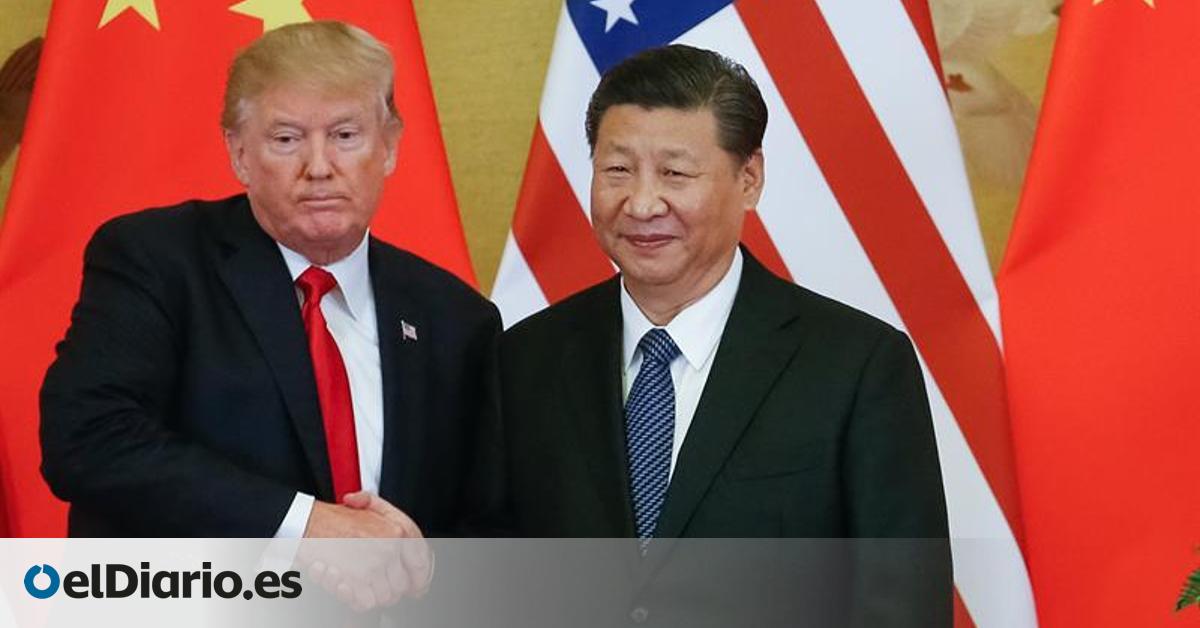
As if they were betting on a casino, the US and China have entered a tariff spiral of incalculable repercussions. First Donald Trump hit with a ‘reciprocal tariff’ of 34% to the Asian giant, who responded in a matter of hours with a rate for that same percentage to US products. Washington counterattacked with an additional 50% reaching a 104% figure. And Beijing, far from alarming, replied with an 84% rise to which the White House tenant responded with 125%. Billions of euros are at stake, financial markets continue to convulse and the risk of a world recession does not dissipate. The EU, on the other hand, contains the breath before the 90 -day break decreed by Trump with which he sees an opportunity for negotiation.
That if Trump’s testosteronic policy is not imposed. And, if someone is unpredictable, that is Donald Trump. In 24 hours he has presumed that all countries were “kissing her ass”, to yield to internal pressure and multimillionaires and managers of North American multinationals when he opened to a negotiation.
To the one who has declared the commercial war is Xi Jinping, which he accuses of “missing respect for world markets.” For their part, what they say in Beijing is that “they will fight until the end.” Despite the tuning they initially showed, nothing seems to indicate that they are going to stop the escalation. And, taking into account that world trade is closely interconnected, the consequences may not have precedents. Beyond tariffs, China has begun to apply new tools that can put the operation of US companies uphill.
According to Bloomberg, China included US companies in the list of entities that it prohibits buying in that country and imposed licenses for exports of some rare earths on which many American companies depend, such as Elon Musk’s Tesla. In fact, the owner of X, who has been one of Trump’s fundamental support in his career to return to the White House, tried to convince him to step on the brake with the tariff battle.
And it is the billionaires and managers of large companies that are stirring against the US president, who had no qualms about entertaining when he won the elections last November. Also within the Republican Party and the Trump administration, the first cracks have opened. After all, tariffs will mean a blow to the economy of that country. Although Trump remains importance to current financial turbulence, he has given a helm, at least for now.
The EU sees an opportunity
The EU strategy has gone to try to negotiate. And, given the little success that he had had until then, he has followed two tactics: to enter Trump’s language with the approval of a first package of tariffs and delve into the discrepancies to try to sit the Trump administration in a true negotiation that moves off commercial belligerence.
48 hours after Musk expressed his desire that there were “zero tariffs” between the two sides of the Atlantic, the president of the European Commission, Ursula von der Leyen, revealed that this had been one of the offers in the conversations with the White House for industrial goods and vehicles. The objective was to raise the pressure on Trump, since in Brussels they knew that there were sectors that look like that approach that their interlocutors had rejected.
On the other hand, the EU follows with its “firm response” when approval of a list of 1,600 American products (representing about 21,000 million euros in imports) that will have a 25%tariff. The initial ambition was reduced by taking out some products, such as the Bourbon whiskey or the dairy products, for fear of an even more angry response from Trump. But in Brussels they also mention it as a gesture of good will.
The intention of the European Commission, which for now keeps silent after Trump’s flying, was to promote a second package of countermeasures next week if there was no “real negotiations by then” and had also made it clear that the first, approved this Wednesday, can “be suspended at any time, if the US accepts a fair and balanced negotiated result”.
Prudence in the reaction
No one dares to forecast the result of the new scenario, but at least they see an opportunity. “Maintaining narrow transatlantic relations is a common responsibility for Europeans and American, regardless of temporary turbulence. So we take full advantage of the next 90 days,” said Polish Prime Minister Donald Tusk, which has been the first to react.
A BREAKS
Meanwhile, it also worries in European capitals, it is a bud recession in the face of the volatility of the situation, which has led to a collapse of the bags valued in 19 billion dollars from the start of the commercial war. Growth forecasts are being reviewed down and in the capitals they contain breathing.
At the same time, the EU continues with the third leg of its strategy (in addition to a call to negotiation and reprisals): the diversification of alliances with other powers, such as India, Central Asia, MercosurSouth Africa … “We will focus as a laser beam in 83% of world trade that goes beyond the US, which means enormous opportunities,” said Von der Leyen on Monday.
In that 83% China is included, a country to which the EU has been forced to look again at the new scenario. Von der Leyen spoke precisely on Tuesday with Prime Minister, Li Qiang, on the occasion of the 50th anniversary of diplomatic relations. But the call coincided with the escalation of the commercial war. “Both leaders discussed the creation of a mechanism to monitor the possible deviation from trade and ensure that any novelty is properly addressed,” the community government said in a statement.
Pedro Sánchez is one of the leaders who has headed that new relationship with the Asian giant with his third visit in three years. There are many interests at stake and Spain intends to expand a market in which it has an important commercial deficit. And, in full climb of the tension with Beijing, Washington has not felt good that approach that, according to the secretary of the treasures, Scott Besent, “would be like cutting off her neck.”
Source: www.eldiario.es

